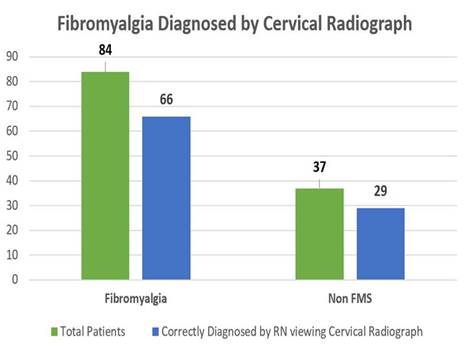Session Information
Date: Tuesday, November 7, 2017
Title: Fibromyalgia, Soft Tissue Disorders, Regional and Specific Clinical Pain Syndromes Poster II
Session Type: ACR Poster Session C
Session Time: 9:00AM-11:00AM
Background/Purpose: Patients with fibromyalgia have widespread pain. We have found that a lateral view of a cervical spine radiograph frequently identifies a loss of the lordotic curve but otherwise normal architecture. We asked rheumatology nurse professionals to evaluate visually whether the cervical spine was straight on the lateral vie in fibromyalgia and non-fibromyalgia rheumatic disease patients.
Methods: 121 cervical spine radiographs were reviewed by a rheumatology nurse without knowledge of the patient’s diagnosis. Only the lateral view of the cervical spine was visualized to determine whether it was straight. A straight cervical spine is seen in fibromyalgia patients and may assist in the diagnosis. Other abnormalities of the cervical spine including disc space narrowing, osteophytes, spondylolisthesis, and reactive bony changes were also noted if present.
Results: Of the 121 cervical spine radiographs reviewed the rheumatology nurse, there were 84 patients with fibromyalgia, and 37 non-fibromyalgia rheumatic disease controls. Without being told the patients diagnosis, the nurse was able to correctly diagnosis 66 (75.5%) of the 84 fibromyalgia patients, and was able to accurately say that
29) of the control patients did not in fact have fibromyalgia.
Conclusion: A straight cervical spine can be used to assist in the diagnosis of fibromyalgia. The loss of lordotic curve without other radiographic abnormalities (disc space narrowing, reactive bony changes, etc.) is present in the majority of fibromyalgia patients and not in the non-fibromyalgia rheumatic disease patients. A straight cervical spine is further evidence of increased muscle tension in fibromyalgia.
To cite this abstract in AMA style:
Katz RS, Katz Small A, Small BJ, Farkasch A. The Cervical Spine in Fibromyalgia Patients: Loss of Lordotic Curve Is Characteristic of Fibromyalgia and Can Assist in the Diagnosis [abstract]. Arthritis Rheumatol. 2017; 69 (suppl 10). https://acrabstracts.org/abstract/the-cervical-spine-in-fibromyalgia-patients-loss-of-lordotic-curve-is-characteristic-of-fibromyalgia-and-can-assist-in-the-diagnosis/. Accessed .« Back to 2017 ACR/ARHP Annual Meeting
ACR Meeting Abstracts - https://acrabstracts.org/abstract/the-cervical-spine-in-fibromyalgia-patients-loss-of-lordotic-curve-is-characteristic-of-fibromyalgia-and-can-assist-in-the-diagnosis/


